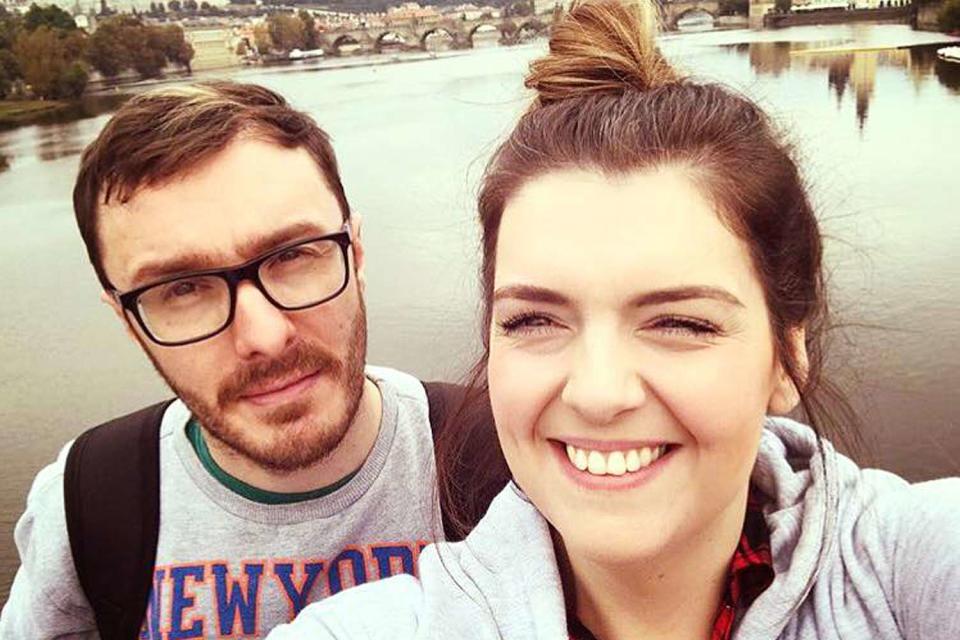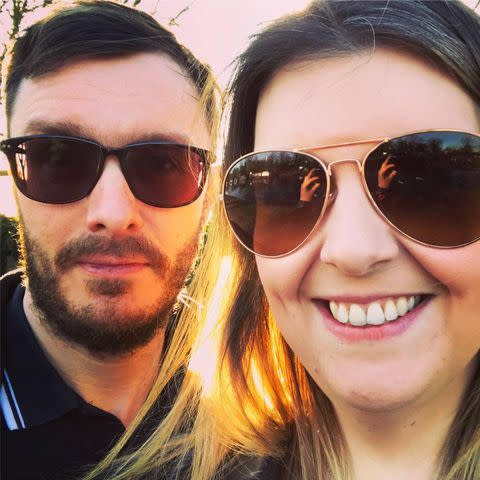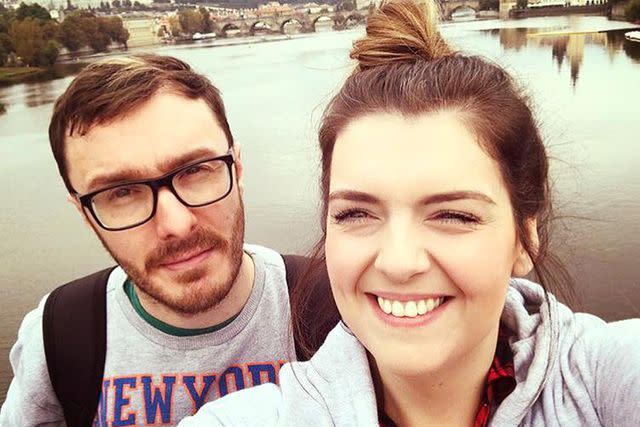Father-to-Be's Death on Morning of Partner's C-Section Was Preventable: Reports
"Should have been the happiest day for both of them," a coroner in England said on Wednesday, June 5

Thomas Gibson/Facebook
Thomas Gibson and Rebecca Moss.Thomas Gibson, 40, died on June 7, 2023 — the same day his pregnant partner Rebecca Moss was due to have her cesarean section
A court in England heard on Wednesday, June 5, that his death could have been prevented if he had been fitted with "an implantable device" such as a pacemaker
The inquest heard on June 4 that a doctor had misinterpreted a scan after Gibson went to hospital after having a severe stomach bug for weeks
The death of a father-to-be on the day his partner was due to have her cesarean section could have been avoided, a court heard on Wednesday, June 5.
On June 7, 2023, Rebecca Moss, from the town of Stretford in Greater Manchester, England, told her partner Thomas Gibson, 40, "Wake up, it's baby day," at around 5:15 a.m. local time. However, a court heard on Tuesday, June 4, that he'd died after suffering a cardiac arrest while sleeping on the couch, PEOPLE previously reported. Moss gave birth to their daughter Harper later that day.
Gibson had attended Wythenshawe Hospital's Accident and Emergency department on May 27 with symptoms of a severe stomach bug that he'd had for around three weeks at that time.
After being assessed by medical staff he was told to return a week later if his symptoms didn't improve after Dr. Thomas Bull said an abnormality seen in his electrocardiogram (ECG) scan was likely to be something he described as an intraventricular block, Sky News previously reported.
An inquest at Stockport Coroner's Court has now heard that if the medical staff had instead fitted Gibson with a device such as a pacemaker, he may have lived, per Sky News, U.K. newspaper The Times, and the BBC.

Thomas Gibson/Facebook
Thomas Gibson and Rebecca Moss.Gibson's death was ruled as sudden cardiac arrest due to myocardial fibrosis, Coroner Christopher Morris said on June 5, per the BBC. This is described as an "inflammation of the heart muscle," per the Mayo Clinic, which can lead to "stroke or heart attack" in severe cases as it "weakens the heart so that the rest of the body doesn't get enough blood."
Morris said at the end of the two-day hearing on June 5, "I can't even begin to fathom what that must have been like for her, particularly in the context of what should have been the happiest day for both of them," per Sky News.
"11 days previously Mr. Gibson had been seen at his local hospital which provides specialist cardiac services," Morris added, per the outlet. "When the clinical team assessed him they did not appreciate that the ECG showed him to be experiencing complete heart block."
"Had this been appreciated Mr. Gibson would have been admitted under the care of cardiologists, a series of investigations undertaken, which would probably have culminated in an implantable device, such as a pacemaker being fitted," he added. "It is likely these measures would have avoided his death."
Morris didn't immediately respond when contacted by PEOPLE.

Thomas Gibson/Facebook
Thomas Gibson and Rebecca Moss.While speaking to reporters outside the hearing, Moss said, "The expertise which could have saved Tom's life was just one phone call away - I sincerely hope that there will be learnings from Tom's avoidable death," the BBC reported.
"I am told that inquests aren't about blame but I have every right to be angry and to seek answers for Tom, Harper and our family," she added.
Dr. Mark Ainsley, who is the clinical director of cardiology for the Manchester University NHS Foundation Trust, said that Gibson could have been fitted with a pacemaker in "less than an hour," per the BBC.
"Do you think that sequence of events would likely have avoided his death?" Morris asked during the inquest, to which Ainsley responded, "I think the short duration between the ECG and his heart giving way, I think it's more than likely he would have avoided his death," the BBC reported.

Thomas Gibson/Facebook
Rebecca Moss and Thomas Gibson.Never miss a story — sign up for PEOPLE's free daily newsletter to stay up-to-date on the best of what PEOPLE has to offer, from celebrity news to compelling human interest stories.
When the scan was first done, a junior doctor found signs of a potential blockage and flagged it to Dr. Bull, a more senior doctor, who gave evidence in court on June 4.
Despite finding the intraventricular block, Sky News stated the medical registrar had said this was "not an uncommon finding" and not clinically "significant" without further heart symptoms.
It was later revealed that the scan had identified a complete heart block which can lead to sudden cardiac death, per The Independent.
The doctor said during the inquest, “I can see now, in retrospect and in hindsight, there is abnormalities over and above those I could see present," the outlet reported.
"We wish again to extend our condolences and sincere sympathies to Mr Gibson's family at this very difficult time," Toli Onon, joint group chief medical officer at Manchester University NHS Foundation Trust, said in a statement obtained by PEOPLE.
"The Trust has undertaken a thorough investigation to examine the circumstances following Mr. Gibson's very sad death, and we apologize for where our care has fallen short of the high standards to which we aspire," Onon added.
"We are committed to providing the best care possible for our patients and we will be reviewing the coroner's conclusion carefully, to ensure further learning for the trust is addressed and applied to our constant work to improve our patient's safety, quality of care, and experience," the medical officer concluded.
For more People news, make sure to sign up for our newsletter!
Read the original article on People.

 Yahoo News
Yahoo News 
